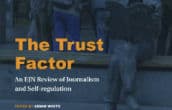|
|
Ethical Journalism News And Debates
|
| The enemies of the BBC, both political and corporate, are circling following the release of the Parliament culture committee report on the future of the corporation earlier this year. Their aim will be to cut or even eliminate the £145 annual licence fee which delivers around £3.7 billion income each year.
Continue …
|
|

|
|
|
|
| Reporters and headline writers often use the ambiguous phrase “officer-involved shooting” – a phrase that needs to go. This vague wording deflects all potential blame from the officer, obscures what actually happened, and gives all benefit of the doubt to armed authorities, encouraging readers to do the same. That makes it even harder to hold rogue cops or broken police departments accountable. (Read more on Poytner and find the original petition here) |
|
| The portrayal of Africa by mainstream media, particularly Western media, paints it as a dark, ugly, hopeless place that is ridden with civil war, militant groups, corruption, violation of freedoms, starvation, chaotic urbanisation and utter desperation. This gives people who have never being to Africa a false, misleading impression of the continent. (Read more on Global Voices) |
|
| Back in 2005, the executive editor of a California chain of community newspapers called AdviceLine with a newly emerging problem: People wanted old stories about them removed from the web archives, or blocked from Google searches. Would that be ethical, the news executive asked?
It was a small problem then, in its infancy. Today, it’s a hot topic. (Read more on Ethics AdviceLine for Journalists) |
|
| While much has been written about safety strategies for journalists in war zones and other hostile environments, there is little advice on how women can handle intimidation, threats and abuse in their newsrooms and on the job. Following is a collection of tips gleaned from female journalists over the years. (Read more on ijnet) |
|
|
|
Reports and Resources
|
| People who work in journalism, like others in professional life, don’t like being told how to do their job. They are notoriously sensitive to complaints, even though they can be lacerating in their criticism of others. They prefer to run their own affairs by creating systems of self-regulation to handle grievances and grumbling about their work from members of the public.
But when these systems of self-regulation don’t work, public anger can lead governments to lay down laws that control how journalists work and what media are allowed and not allowed to publish.
The report – The Trust Factor – tests how well journalism is monitored and its mistakes handled in 16 countries, including challenging hotspots in the Middle East, Africa, Latin America and Asia.
Continue …
|
|

|
|
| The world of journalism is full of good intentions but the idea of news media as a cornerstone of democracy and ethical values is fast disappearing according to a report released by the Ethical Journalism Network.
The report, Untold Stories: How Corruption and Conflicts of Interest Stalk the Newsroom, covers 18 countries and exposes how financially-stricken news media are being overwhelmed by political and corporate forces.
The report finds that in countries both rich and poor, there are ‘dark arts’ at work in newsrooms: media managers are doing deals with advertisers to carry paid-for material disguised as honest news; reporters and editors accept bribes and irregular payments; and a culture of dependence on political and corporate friends makes it increasingly difficult to separate journalism from propaganda and impartial reporting from public relations.
This survey concludes that a toxic mix of political and business pressures are leading to systematic disregard of ethical journalism principles. Although journalists and media insiders know what is going on, they are often reluctant to talk about it openly.
Continue …
|
|

|
|
Are You Following The EJN?
|
|
|
|
|
|
|